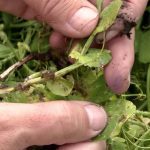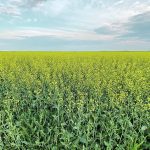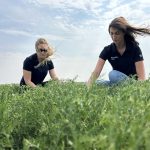Tag Archives fungicide

VIDEO: Timing fungicide application for mycosphaerella blight in peas
It pays to know whether and when to spray

Stripe rust confirmed in Alberta fields
Farmers are encouraged to scout their fields for stripe rust disease so that they know if fungicide applications are warranted

Fungicide spraying season approaches for peas
Mistaking bacterial and fungal diseases like mycosphaerella can be a costly mistake for farmers

Firm hopes to fill generic input void
Farmers Business Network Canada plans to step in now that AgraCity has left the market

Later spraying may help with DON
Agronomists change their advice as to when to spray for fusarium infection

Later called better when spraying for fusarium
Some advice to growers still recommends spraying earlier, but researchers say recent studies point in the opposite direction

Biologicals business receives funding boost

Wet conditions stoke sclerotinia fears
The Canola Council of Canada said split fungicide applications will protect canola longer if the bloom period is delayed
Glacier FarmMedia – Manitoba canola producers are hoping this season will echo last year’s scarcity of sclerotinia, but recent wet conditions may have laid groundwork for the fungus to return. Dry weather last year tamped sclerotinia. The yearly disease survey found that, of 129 surveyed fields, only 13 per cent showed signs of the disease. […] Read more
AIM23: Come see the science that’s continuing to transform farming






